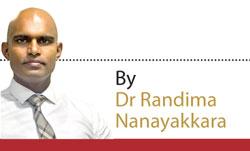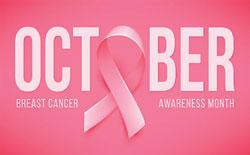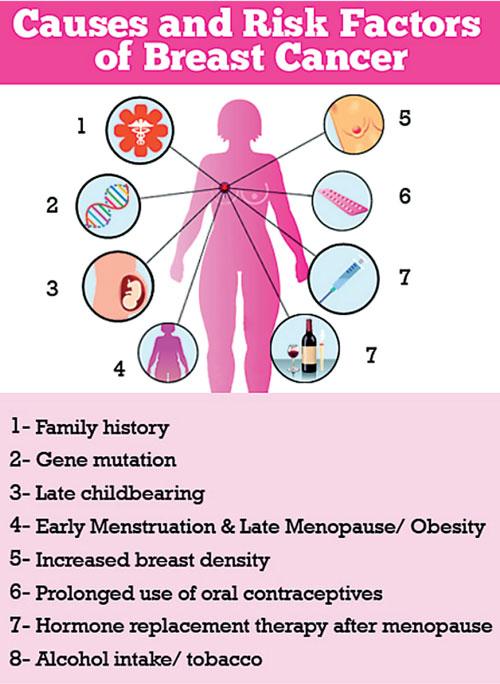01 Oct 2020 - {{hitsCtrl.values.hits}}
 There is no certain way of preventing breast cancer. However, according to the World Health Organisation (WHO), about 30-50% of cancers are preventable. Genetics account only for about 5% of cancer, known as hereditary cancers. Our lifestyle choices, the food we eat and our level of physical activity has a significant impact on the overall cancer risk. Since prevention offers the most economical long-term strategy for control of cancers, national policies in addition to treatment should also focus on raising public awareness to minimise exposure to cancer risk factors as well as promoting healthy lifestyles.
There is no certain way of preventing breast cancer. However, according to the World Health Organisation (WHO), about 30-50% of cancers are preventable. Genetics account only for about 5% of cancer, known as hereditary cancers. Our lifestyle choices, the food we eat and our level of physical activity has a significant impact on the overall cancer risk. Since prevention offers the most economical long-term strategy for control of cancers, national policies in addition to treatment should also focus on raising public awareness to minimise exposure to cancer risk factors as well as promoting healthy lifestyles.

Breast cancer is the commonest cancer among females, affecting nearly 2.1 million females globally each year. While breast cancer rates are higher in the developed regions, its rates are increasing in the developing regions as well. In Sri Lanka, it is the most common cancer. Over 3,000 new breast cancer patients are diagnosed each year, which accounts for about 25% of all female cancers and nearly 15% of all cancers.

Female gender, advancing age, family history, early puberty and late menopause are some of the non-modifiable risk factors for breast cancer. In addition to the above, there are many modifiable risk factors, the control of which helps prevent breast cancer. Since October is Breast Cancer Awareness Month, and there is a global movement to increase public awareness about the disease, some frequently asked questions about breast cancer risk and prevention are addressed below.
1. Can a healthy diet reduce the risk of breast cancer?
A nutritious diet low in fat (less than 30 grams) can help lower the breast cancer risk. The diet should include at least 5 servings of orange vegetables such as carrots, pumpkins, sweet potatoes, papaya and oranges, as well as cruciferous vegetables such as broccoli, cauliflower and cabbage a week. A diet rich in fat triggers oestrogen production, which in turn increases the risk of breast cancer.
2.Can exercise reduce the risk?
Physical activity, in the form of moderate to strenuous exercise of more than three hours a week, has shown to reduce the risk by 30-40%. Exercise boosts one’s immunity and a 30-45 minute brisk walk per day is recommended.
3.Are breast cancers mostly familial or inherited?
Nearly 90-95% of breast cancers are sporadic, meaning it can affect a woman without a previous family history of cancer or genetic predisposition. Only a minority (5%) of breast cancers is familial and hereditary. Being a woman and getting older are the main risk factors for breast cancer.
4.Does smoking increase the risk?
Needless to say, in addition to heart and lung disease, smoking is a confirmed risk factor for many cancers including breast cancer. Both active and passive smoking are contributory. The benefits of quitting begin the day one stops smoking, and this advantage becomes greater as time goes by.
5.Does drinking alcohol increase the risk?
Having more than one drink a day, irrespective of the alcohol percentage and content, including wine, beer and other spirits, increases the risk. While there are claims of heart health benefits by drinking a glass of wine, alcohol increases the production of oestrogen in the body and the more you drink, the risk increases.
6.Does stress cause breast cancer?
Many affected women believe that stress and anxiety caused them to develop breast cancer. A large study conducted in the United Kingdom regarding this association found no link between breast cancer risk and stress. However, living a happy, satisfied and stress-free life can have a hugely beneficial effect on one’s health.
7.Does hormonal contraceptive increase the risk?
All hormonal contraceptives could slightly raise your odds of breast cancer. This should not be a reason to panic if you are on the pill. The risk is very small and is only significant in young women with a strong family history of breast cancers and in those who have been on the pill for more than 5 years. If you have a family history, you can discuss other options with your gynaecologist.
8. Is Hormone Replacement Therapy (HRT) linked to breast cancer?
Higher levels of oestrogens due to exogenous hormones taken as HRT in women with menopausal symptoms have shown to increase the risk of breast and ovarian cancer. Therefore, it is cautioned in females with a family history of these cancers.
9.Is obesity a risk factor?
Being overweight or obese greatly increases the risk of breast cancer. This is particularly so if obesity occurs later in life after menopause. If you are someone who has already gained weight, you will be interested to know that weight loss seems to help reduce this extra risk.
10.Does breastfeeding prevent breast cancer?
Breast-feeding might reduce the risk. The longer you breastfeed, the greater the protective effect.
11. Are nulliparous women at higher risk?
Women who haven’t given birth to a child have a 20-40% higher risk of developing postmenopausal breast cancer as compared to women who first gave birth before the age of 30 years.
12.Avoid exposure to radiation
Exposure to ionizing radiation is a well known long-established environmental risk factor for developing breast cancer. If you are working in a vulnerable risk environment with high radiation, such as in hospitals with radiological imaging including X rays and CT scans, it advised having a dosimeter to keep a check on the radiation dose one gets exposed to.
13.What foods are linked with breast cancer?
As countries become more westernised, their risk of breast cancer increases. Women who migrate from a country with low breast cancer incidence to a western country often experience a significant rise in their risk. One of the reasons for this appears to be a Western diet rich in sugars and fats as well as frequent consumption of fast foods, and not any particular food item or additive.
14. Do men get breast cancer?
Although rare, men too can get breast cancers. About 1-2% of all breast cancers are in males. Alcohol intake, liver disease, obesity, family history and radiation exposure are some of the risk factors that cause male breast cancer. Klinefelters syndrome is a rare genetic disorder in which a male has an extra ‘X’ (female) chromosome, leading to higher circulating levels of oestrogen. These males have a higher risk of breast cancers.
15. Do mammograms cause cancer? Are they safe?
Some women are apprehensive of being exposed to radiation during mammography. Don’t be afraid. This is superfluous anxiety. Modern-day mammography involves only a tiny amount of radiation, smaller than a regular chest X-ray.
Mammograms save lives. Detection of breast cancer in early stages reduces breast cancer deaths by 25-30%. Mammography is a quick procedure and the discomfort is very minimal in most women. Get a digital mammogram, they give superior images with higher detection rates.
Finally, I’d like to conclude by emphasising the importance of living a healthy active lifestyle, quitting smoking and limiting alcohol consumption. Besides, all women should practice monthly self-breast examinations, to familiarise one’s self with how the breasts normally look and feel. The self-breast examination helps in detecting cancer in the early stage when it is more likely to be treated effectively. If you find a lump in your breasts, don’t panic. On most occasions, they turn out to be benign (non-cancerous). However, to confirm the nature of such breast lumps, seek urgent medical advice.
The writer is a consultant in cancer surgery with an interest in breast cancer and breast disease.
02 Jan 2025 10 minute ago
02 Jan 2025 14 minute ago
02 Jan 2025 29 minute ago
02 Jan 2025 32 minute ago
02 Jan 2025 44 minute ago